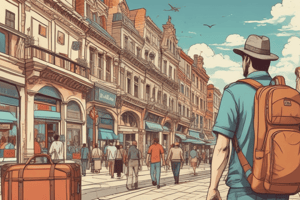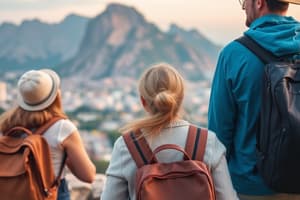Podcast
Questions and Answers
What are the key differences between the organized mass tourist and the individual mass tourist according to Cohen's typology?
What are the key differences between the organized mass tourist and the individual mass tourist according to Cohen's typology?
The key differences are that the organized mass tourist has fixed itineraries, planned stops, and guided organizers making the decisions, leading to maximum familiarity and minimum novelty. In contrast, the individual mass tourist has some control over their itinerary and time allocations, with major arrangements made through a travel intermediary, but they still remain largely within the environmental bubble of their home country ways.
How does the explorer tourist differ from the drifter tourist in Cohen's typology?
How does the explorer tourist differ from the drifter tourist in Cohen's typology?
The explorer tourist usually plans their own trips and tries to avoid developed tourist attractions, with a desire to mix with locals but still protected within the environmental bubble. In contrast, the drifter tourist plans their trip alone, avoids tourist attractions, and lives with the locals, becoming almost entirely immersed in the host culture, with novelty being dominant and familiarity disappearing.
What is the role of travel intermediaries in Cohen's tourist typology?
What is the role of travel intermediaries in Cohen's tourist typology?
According to Cohen's typology, the individual mass tourist makes major arrangements through a travel intermediary, while the organized mass tourist has their itinerary and stops planned by guided organizers.
How does the level of host culture immersion differ across Cohen's tourist typology?
How does the level of host culture immersion differ across Cohen's tourist typology?
Explain the concept of the 'environmental bubble' in Cohen's tourist typology.
Explain the concept of the 'environmental bubble' in Cohen's tourist typology.
How does the level of novelty and familiarity differ across Cohen's tourist typology?
How does the level of novelty and familiarity differ across Cohen's tourist typology?
Which tourist typology is concerned with social status, seeks sensual pleasures, and prefers interacting with people of his/her own kind?
Which tourist typology is concerned with social status, seeks sensual pleasures, and prefers interacting with people of his/her own kind?
Which tourist typology does not buy souvenirs, does not live a life of luxury, is not concerned with social status, does not take photos, and does not contribute to the economy?
Which tourist typology does not buy souvenirs, does not live a life of luxury, is not concerned with social status, does not take photos, and does not contribute to the economy?
Which tourist typology explores places privately, is interested in the environment, does not buy souvenirs, and does not exploit the local people?
Which tourist typology explores places privately, is interested in the environment, does not buy souvenirs, and does not exploit the local people?
Which tourist typology does not understand the local people, does not exploit the local people, explores places privately, and searches for the meaning of life?
Which tourist typology does not understand the local people, does not exploit the local people, explores places privately, and searches for the meaning of life?
Which tourist typology is interested in the environment, does not buy souvenirs, does not exploit the local people, explores places privately, and takes photos?
Which tourist typology is interested in the environment, does not buy souvenirs, does not exploit the local people, explores places privately, and takes photos?
Which tourist typology takes physical risks, experiments with local food, keenly observes the visited society, and does not exploit the local people?
Which tourist typology takes physical risks, experiments with local food, keenly observes the visited society, and does not exploit the local people?
Explain the concept of psychographic segmentation in the context of tourism.
Explain the concept of psychographic segmentation in the context of tourism.
What is the main purpose of product-related grouping in tourism?
What is the main purpose of product-related grouping in tourism?
According to the Butler Model, describe the 'Exploration' stage of tourist development.
According to the Butler Model, describe the 'Exploration' stage of tourist development.
How does the 'Involvement' stage of the Butler Model differ from the 'Exploration' stage?
How does the 'Involvement' stage of the Butler Model differ from the 'Exploration' stage?
Explain the concept of 'host culture immersion' in the context of tourism typologies.
Explain the concept of 'host culture immersion' in the context of tourism typologies.
According to Cohen's Tourist Typology, what type of tourist would be most interested in experiencing the host culture in an authentic and meaningful way?
According to Cohen's Tourist Typology, what type of tourist would be most interested in experiencing the host culture in an authentic and meaningful way?
Flashcards are hidden until you start studying




